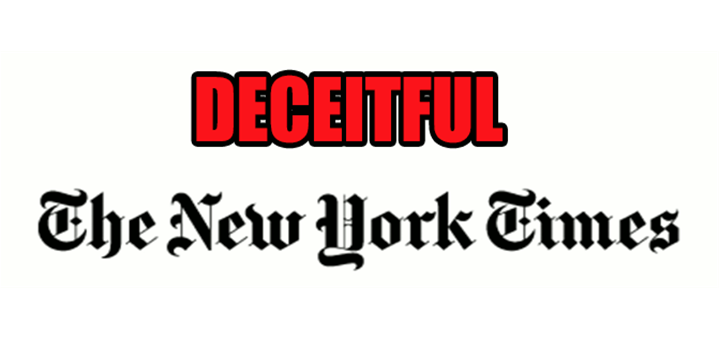The New York Times, like most of the rest of the media, has been having a field day with the dispute between Khizr Khan and Donald Trump. As I said on the Rundown episode we did on the matter, I think Khan put himself in the line of rhetorical fire by slamming Trump at the Democratic National Convention. Do I think calling out Khan was the smartest thing Trump could have done for his campaign? No. I do not. Still, if he can ride out this wave of media and intraparty condemnation, I think he will be fine for the fall finale.
Since he’s been able make that ride 100’s if not 1000’s of times before, I like his chances. But the thing that has really struck me is how the media has turned this into a full-on feeding frenzy when it comes to Trump and his campaign. Clearly, many of them think this is their chance to sink The Donald once and for all. Too their credit (and unlike many media outlets), The New York Times has what they call a Public Editor. In reality, this is just a fancy name for an ombudsman. Actually, now that I think about it, it’s really just a dumbed-down name for an ombudsman.
At any rate, here’s what a public editor/ombudsman does:
The job of the public editor is to supervise the implementation of proper journalism ethics at a newspaper, and to identify and examine critical errors or omissions, and to act as a liaison to the public. They do this primarily through a regular feature on a newspaper’s editorial page. Because public editors are generally employees of the very newspaper they’re criticizing, it may appear as though there is a possibility for bias. However, a newspaper with a high standard of ethics would not fire a public editor for a criticism of the paper; the act would contradict the purpose of the position and would itself be a very likely cause for public concern.
And here’s why I’m talking about it now…
Do a write-up about this. @nytimes & @nytpolitics never once tweeted this post on their feeds.https://t.co/gz0TBkfWwp
— AlleyCat Blues (@AlleyCatBIues_) August 3, 2016
Now, why wouldn’t the Times want to promote this story, you ask? I guess it’s because the new person they hired as public editor laid a beating on their recent Hillary Clinton coverage…
Hillary Clinton, in a rare interview on Fox News last Sunday, claimed that the F.B.I. director, James B. Comey Jr., had called her statements about her private email servers “truthful” and said she has been consistent with the American people in her accounts about the controversy. As it turns out, Clinton’s contentions in the interview were misleading, bordering on false.
If you’re getting all your political news from The New York Times, this may be the first time you’re hearing this. Clinton’s remarks were covered by several major news organizations, several of which pointedly challenged the Democratic nominee’s candor. But nothing on the interview ever appeared in The Times, either online or in print.
In the Fox appearance, Clinton was asked by Chris Wallace, the anchor, about previous statements she’s made when questioned on the email controversy, while he played tapes of her past remarks to the public.
“After a long investigation, F.B.I. Director James Comey said none of those things that you told the American public were true,” Wallace said.
Clinton pushed back. “Director Comey said my answers were truthful, and what I’ve said is consistent with what I have told the American people: that there were decisions discussed and made to classify retroactively certain of the emails,” she said.
The Washington Post, NPR, NBC News and PolitiFact all challenged Clinton’s claims, saying they appeared to be based on a selective and misleading interpretation of Comey’s remarks. The Post awarded her “Four Pinocchios,” the worst truth-telling rating it gives, for statements it classifies as “Whoppers.”…
I asked Carolyn Ryan, The Times’s political editor, about the decision not to cover Clinton’s remarks about the email controversy. Here’s how she responded: “It is a subject we have covered aggressively — especially how her comments compare to what the F.B.I. found — and will continue to do so.”…
It’s hard to tell whether that will prove true. What seems less arguable is that Clinton, like Trump, is a historically unpopular figure, and a small but critical block of voters is still looking for information that might help them answer two questions: Is Trump a reckless bully with no sense of decency and poor judgment? And is Clinton someone Americans can really trust?
As the general election unfolds, it’s essential that whatever doubts linger about the candidates, these voters believe that The Times will give them the information they need to answer those questions.
The New York Times is just one outlet, but this is going on across the media landscape. Hillary is getting away with murder while Donald Trump gets raked over the coals for stupid stuff like the Khan spat and jokes about Russian espionage. Credit where credit is due: It’s good that this even appeared in the Times, but shame on them for allegedly trying to bury it by not sharing it on their social accounts. It’s well worth a read and a share, even if the other (non-public) editors there don’t think so.




